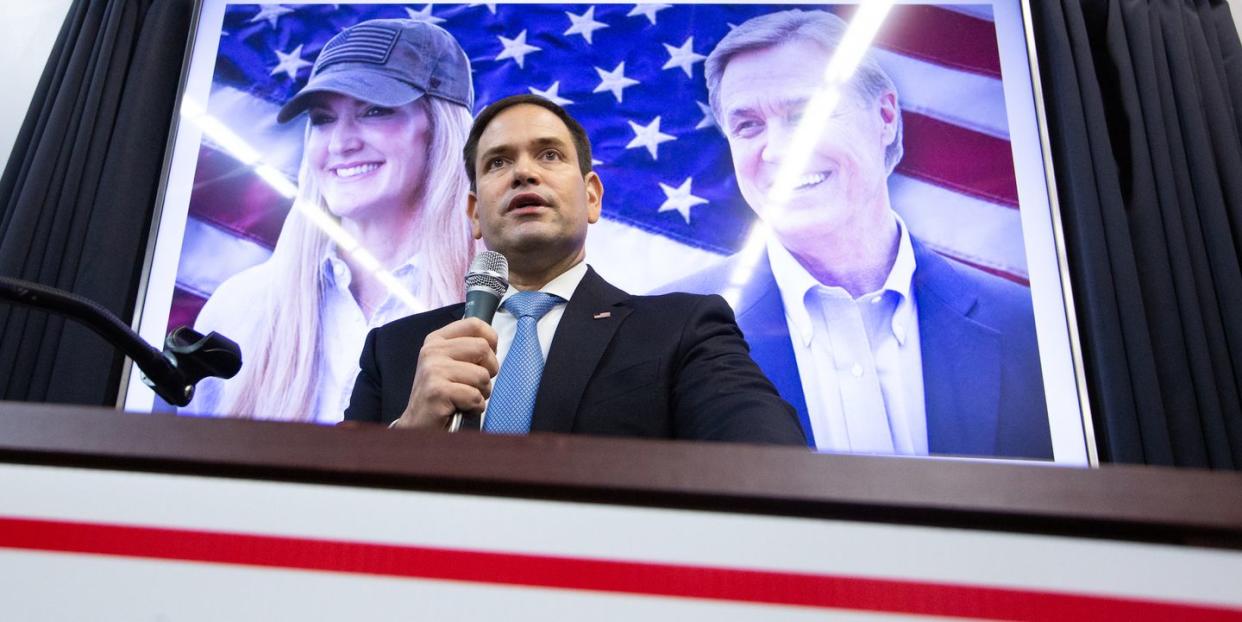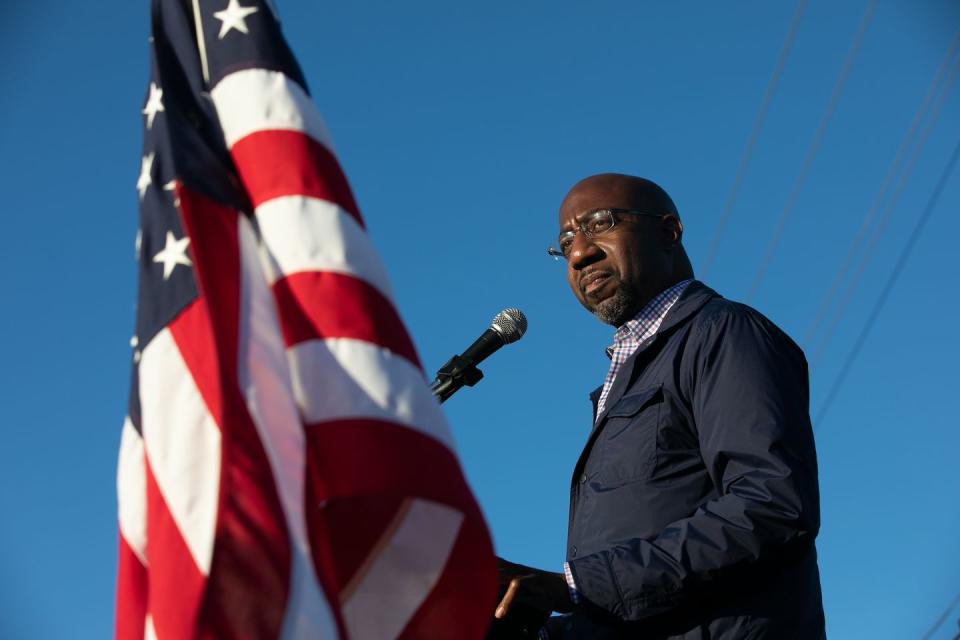Amy Coney Barrett's Faith? Off-Limits. Raphael Warnock's? Fair Game.

- Oops!Something went wrong.Please try again later.
- Oops!Something went wrong.Please try again later.
One of the great strengths of the conservative movement is the capacity of the entire apparatus, from Fox News superheroes on down to the rank-and-file shitposter, to get intergalactically outraged in unison and on-demand. The resentment machine is so fine-tuned at this point that it is capable of kicking into high gear before the outrageous incident has even occurred. We saw this ahead of the nomination hearings for Amy Coney Barrett, when Republicans got pre-outraged about potential Democratic questioning that might probe Barrett's religious faith—including her membership in People of Praise, a Catholic group with rituals and traditions that...fall outside mainstream Church practice. Senator Dianne Feinstein blundered her way through some questioning on this front during hearings on Barrett's appointment to an appeals court in 2017, but there was virtually no Democratic probing here this time around, surely at least in part because the pre-outrage was so intense. This stuff works.
Among the early outrage merchants was Senator Marco Rubio, who issued a statement on September 26 that was preemptively indignant. "Sadly, I expect my Democratic colleagues and the radical left to do all they can to assassinate her character and once again make an issue of her faith during her confirmation process," he said. Assassination by radicals! That does sound bad. Questioning someone's fitness for public office based on their religious beliefs is completely unacceptable, you see. It shouldn't factor into how you assess their candidacy at all. Just ask Senator Marco Rubio, who offered some thoughts on Wednesday regarding Raphael Warnock, the Democratic candidate in one of Georgia's two upcoming Senate runoff elections.
Not shocked #Georgia Democrat Senate candidate Raphael Warnock said “You cannot serve God and the military” at the same time. These & even crazier things is what the radicals who control the Democratic party’s activist & small dollar donor base believepic.twitter.com/bQyBuKLwjb
— Marco Rubio (@marcorubio) November 18, 2020
Never mind that what Warnock is saying appears to be an adaptation of the Sermon on the Mount delivered by Jesus Christ, a guy who never was big on militarism. And never mind that Warnock can often be found speaking from the pulpit of Ebenezer Baptist Church, once home to Martin Luther King, Jr., who himself said, "A nation that continues year after year to spend more money on military defense than on programs of social uplift is approaching spiritual death."
And never mind that critiquing the destructive and insanely expensive misadventures of American empire is not, contrary to the party line of Bush-era Republicans, an attack on citizens who choose to serve in the military. In fact, demanding just cause for sending American men and women into harm's way is the single best way to advocate on behalf of The Troops. After all, about two thirds of veterans now say the war in Iraq was not worth fighting. This is just about the only issue where Donald Trump has healthy instincts, although it's impossible to trust that his newest push to withdraw American forces from the Mideast is based in the public interest. But this is also the one issue where Traditional Serious Republicans like Rubio or Mitch McConnell will reliably break with the president. And some of those Bush-era patriotic attack dogs have, after all, now restyled themselves as Never Trumpers.

But back to the doctrine of unassailable personal faith. Since when does Rubio think it's OK to attack someone based on their religious beliefs? Are Amy Coney Barrett's off-limits simply because she and the People of Praise have tried to keep her membership on the down-low? Is it suddenly acceptable whenever the opportunity arises to paint a Democrat in an important Senate race as a Jeremiah Wright figure? Is it a blatant bad-faith double standard to be used as a shield for Republicans, and a sword against Democrats? Do the rules go out the window if you're trying to win a Senate majority through two candidates, one who's playing footsie with QAnon and the other who engaged in racist mocking of the vice president-elect's name to get a rise out of a rally crowd?
The whole thing seems similar to the perpetual freakouts over Cancel Culture, which usually attempt to erase the notion that there are boundaries on what it's acceptable to say in our society, and we're all just fighting over where they are. In much the same way, there are boundaries to what kind of religious beliefs you can hold while occupying an office of the public trust. If someone were to believe that their Christian faith tells them only white people should enjoy the full rights of citizenship, they would be totally OK to serve as a senator or a Supreme Court justice in, say, 1857. If they were up for the job today, however, it would be perfectly reasonable—in fact, absolutely necessary—to interrogate them about how their religious beliefs inform their intent to enforce a racial hierarchy. It's not imposing a "religious test," which would be unconstitutional, to attempt to marshal public opinion against this person's fitness for holding office based on their expressed beliefs. It's democracy. The reason we haven't had a Satanist president is not that they're banned, but that most Americans do not find those kind of religious beliefs acceptable.

It's almost as if, considering that politics is the process by which we distribute power and resources in society, religion has always been political. Republicans know this, which is why they fight so hard to depict their own beliefs as quintessentially American and beyond question. But asking how someone's religious beliefs will inform their behavior in public office is entirely justified. If someone says that their Christian faith provides the guiding principles of their life, it stands to reason those principles will inform how they act on issues of war and peace, healthcare and housing, climate and environment. We should want to know how they interpret those principles!
Rubio is free to question Raphael Warnock's interpretation of Christian scripture and how it might impact his behavior as a senator. We should also be free to wonder how Rubio's journey from "Catholicism to Mormonism back to Catholicism to a Southern Baptist Convention-affiliated evangelical megachurch and finally back to Catholicism"
has informed his own politics. (Hint: they're malleable!) But nobody wants to hear about how Amy Coney Barrett's bizarro religious sect is off limits when she's been nominated to make decisions that will govern all our lives for decades. Or at the very least, Rubio could say something when people go after Ilhan Omar, or when the leader of his party institutes a Definitely Not a Muslim Ban. Not that we ought to be surprised by this lack of consistency from the guy who used to say the president is an "erratic individual" who "spent a career sticking it to working people," a man unfit for the office on the basis that he is "the most vulgar person" ever to seek it, "a con artist" who ran "a fake university," then spent four years as a loyal Trump soldier.
You Might Also Like

